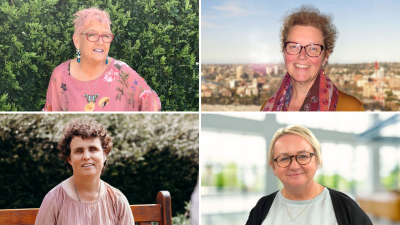Ashleigh, Diversity and Inclusion Lead, shares simple adjustments workplaces can make to improve accessibility for Autistic employees.
April is Autism Acceptance Month, a time to recognise and celebrate the experiences and contributions of Autistic people.
In recent years, significant progress has been made in increasing awareness and acceptance of Autism, not least thanks to the many amazing Autistic advocates who have worked tirelessly to bring the lived experience of Autistic people to the world.
We are moving away from the narrative of curing or converting Autistic people and instead focusing on accepting, supporting, and including Autistic people and advocating for their rights. This is a significant transformation for all Autistic people, their allies, and the wider neurodivergent community.
To celebrate Autism Acceptance Month, Ashleigh Sternes, Diversity and Inclusion Lead at Life Without Barriers, sat down with us to share her lived experience as an Autistic person.

Image: A close-up of Ashleigh Sternes, Diversity and Inclusion Lead, wearing a black top and jacket, looking at the camera.
“I was diagnosed with Autism in 2021, and late diagnosis as an adult is like realising you've been trying to run a Windows operating system on a Mac your entire life. I had 30 years to perfect masking to present as neurotypical, which was exhausting and evidently didn't always work because people have called me weird my entire life,” Ashleigh shared.
“I've worn weird proudly, but being diagnosed made me realise that it's just because my brain works a little differently, and that's something to be celebrated.”
“The most significant difference it's made in my life is that I now give myself permission to work with my brain and not against it.”
Autistic people still face discrimination and other challenges. As with all populations, Autistic people have a wide range of talents and challenges that are often not recognised by the world they are born into.
“The unemployment rate for Autistic people is three times the rate for people with disability and almost eight times the rate for non-disabled people. Autistic adults in Australia are unemployed or underemployed. They're more likely to work part-time or be employed in roles that underutilise their skills,” said Ashleigh.
“Autistic people want to work just like everyone else. We read a lot about Autistic people being suited to IT roles, but I think we need to move beyond that stereotype.”
“People with disability should be represented in our workplaces, in all roles and at all levels of leadership.”
“At Life Without Barriers, our Access Inclusion and Employment Plan aspires to 15% of our workforce at all levels of our organisation being people with disability, and as of 2023, that figure is sitting at 14%.”
Autistic people may experience the world differently, and that’s something to be celebrated and embraced, particularly in the workplace. When asked how employers can make workplaces more accessible for Autistic employees, Ashleigh had a few tips to share.
“All workplaces should make adjustments to their recruitment and selection processes to ensure Autistic people have an equitable opportunity to showcase their skills, talents, and experiences.”
“If workplaces don't make those changes available to everyone, at the very least, they should be asking every candidate what adjustments they need.”
“One adjustment workplaces might make is providing the interview questions in advance. Another might be communicating with the candidate in a way that works best for them, which might look different from the way that you usually do things.”
“We also need to make sure that workplaces are accessible and inclusive when we get in the door. You've invited us in, but it may not be welcoming and safe once we get there.”
“Workplaces need to be asking every new starter whether they need workplace adjustments at onboarding, but those conversations need to be ongoing. Leaders need to approach conversations with their disabled employees with an open heart and an open mind. We're not scary, and it's not rocket science, but empathy can be a skill that some leaders need to invest in.”
“Ask Autistic people what they need, listen to them and then work with them to make it happen.”
“Employees with disability, myself included, have been made to feel like we're asking too much. We're essentially doing a risk assessment of our employer to determine whether or not it's safe to share information about our disability.”
“For me, I need flexibility and autonomy. I'm much more productive working remotely because being in an office can be overwhelming from a sensory perspective.”
Ashleigh explained that when her access needs are met and supported, some elements of being Autistic become strengths, helping her to succeed in her role.
“Every Autistic person is different. I find strengths in my ability to hyperfocus and think about problems differently. I'm highly organised and efficient, and I have a high, sometimes too high,” Ashleigh smiles, “attention to detail which strays into perfectionist territory.”
“I'm also honest, but sometimes a little too honest,” Ashleigh laughs, “which means I can come across as a little blunt. I can struggle with vague instructions and a lack of notice. I have a supportive leader and I include my accessibility requirements in my email signature so that people know how to best work and communicate with me.”
“So, to conclude, in a workplace that supports and includes me, the ways in which I work differently are strengths. In a workplace that didn't, they might not be seen that way.”
Ashleigh uses identity-first language and acknowledges Autism Acceptance Month in a way that centres Autistic people and as a celebration of Autistic pride—nothing about us without us.


